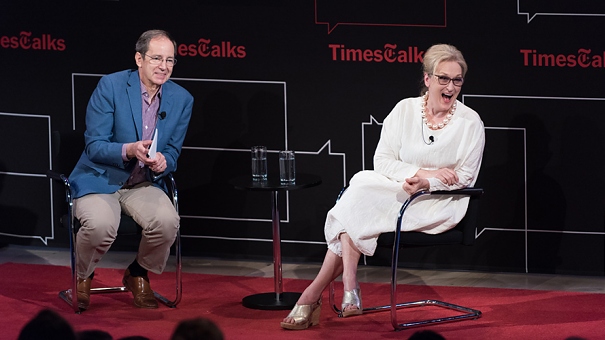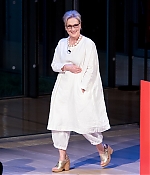|
Simply Streep is your premiere source on Meryl Streep's work on film, television and in the theatre - a career that has won her the praise to be one of the world's greatest working actresses. Created in 1999, we have built an extensive collection to discover Miss Streep's body of work through articles, photos and videos. Enjoy your stay.
|
Celebrating
25 years
of SimplyStreep
|
For the promotion of “Florence Foster Jenkins”, Meryl Streep talked about the connection between acting and music with New York Times chief classical music critic Anthony Tommasini. “They’ll be silent when I leave,” joked Meryl Streep after the audience of her August 11 TimesTalk leapt to their feet upon her entrance. The 19-time Oscar-nominated actress (and three-time winner) has made an indelible mark on film, the profession of acting and her audience’s hearts. Streep joined New York Times chief music critic Anthony Tommasini at the Times Center to discuss her film, Florence Foster Jenkins, which opens today. Like many of the characters in Streep’s repertoire, Florence Foster Jenkins is an historical figure, this time an heiress with a devout love of music and singing with the means to make a career on the stage, but not really the voice to. But even singing badly takes extreme skill, and Streep learned to sing the arias in full voice with full technique and then “screwed it up.” Her vocal chops have come to light in more recent years with her turn as Donna in the movie version of Mamma Mia! and the Witch in Into the Woods. Still, Streep certainly considers herself an actress first. “I enjoy singing through the persona of a person,” she said. Yet, in her mind, music is a more powerful medium of communication than dialogue or anything else, no matter how much work you put into it. “If you can get there,” she said, “music does a thing that no [amount of] preparation [by] an actor can do.”
Streep called on Stephen Sondheim, her Into the Woods composer/lyricist and collaborator, as the master. His work is “the most beautiful marriage of lyric and a melody,” she said. “You can just walk into his songs. … I don’t know that there’s anyone else who can do it.” As Tommassini noted, while Streep’s film career includes only two musicals, there is musicality in the voices of so many of her characters, as evident in the played clip of Streep as Julia Child in Julie & Julia. Of course, Julia Child’s voice was distinctive, but Streep was clear that the sound of her characters is something she crafts and invests in no matter who she’s playing. “Every one of the women I have played has had that same signature sound … even the ones I made up,” she said. “If you’re inventing a whole person, you have to find them [entirely].” While the topic at hand was Florence Foster Jenkins, in a discussion about musicality, there was plenty of theatre talk. Streep calls herself a “theatre child.” In fact, her first roles were in her high school musicals: Marian the Librarian in The Music Man, Daisy Mae in Lil’ Abner and Laurey in Oklahoma! She cites Chekhov and August Wilson as her favorite playwrights, and the film adaptation of Tony Kushner’s Angels in America is still the piece she is “more proud of than anything.” In fact, Streep confessed that theatre is her number one, but the lifestyle was unsustainable when she had children. For them, she gave up the thing she loved most—and the grueling schedule that goes with it. Streep is open to a return to the stage, albeit only for an original work.














